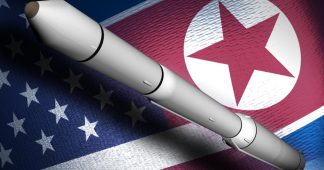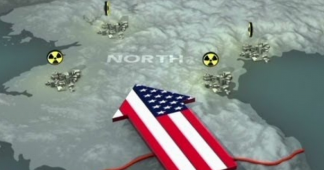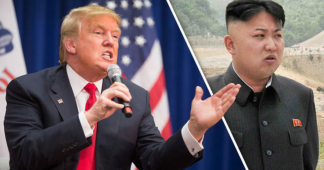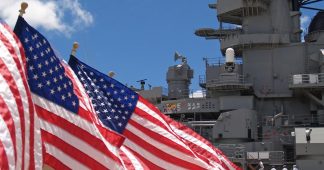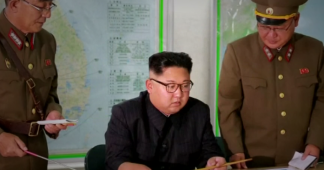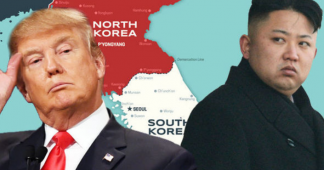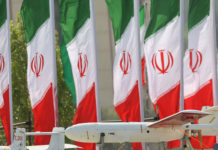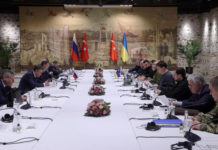U.S.-China Relations: A Game of Strategic Reassurance
By
The tension in the Korean peninsula is putting to test the future of U.S.-China relations. President Donald Trump has accused China of not taking a tougher stance on North Korea. To convince China to take a tougher stance, Henry Kissinger has proposed that the United States first agree with China “of what follows after the collapse of the North Korean regime.” A central part of the agreement would be for the United States to withdraw its forces along the Korean demilitarized zone (DMZ) at the 38th parallel after the regime’s collapse. As the logic goes, this would help to allay China’s fears of a U.S. military base next to its border.
At the heart of Kissinger’s proposal are the problem of credible commitment and the need for strategic reassurance. First, given the uncertainty, distrust, and fear inherent in U.S.-China relations, China may not believe in the U.S. commitment to withdraw. Second, if the United States agrees to withdraw, this would weaken its status as a security guarantor in the region and precipitate a regional arms race.
Strategic reassurance is the answer to both concerns. The United States has strong incentives to agree with China on what follows the collapse of North Korea, including the removal of troops from the DMZ. This option is attractive to the United States compared to a scenario of a nuclear-armed and intercontinental ballistic missile–capable North Korea; a denuclearized North Korea is also in China’s interest. However, before China can agree to take a tougher stance on North Korea, the United States has to offer a credible commitment to China to reduce its fears of a U.S. military base next to its border.
In practice, strategic reassurance means that a party is willing to pay a high price as a way to signal its credibility to the other party. The higher the cost, the more credible the signal. The Kissinger formula is one good example. Another example is Iran’s nuclear deal with western powers. Iran had agreed to third party inspections to reassure western countries of its compliance, who in turn rewarded Iran’s following of the pact despite the Trump administration’s open opposition to the deal.
On the second issue of regional security, the United States would have to reassure its allies, Japan and South Korea, that collateral damage from a war with North Korea would be minimal and that their security interests would not be compromised in a post-North Korean regime scenario. This is where the United States and China could bargain for a new security architecture, but the window of opportunity to do so under a noncrisis scenario is getting smaller by the day as North Korea develops its capabilities. However, if the reassurance is successful, a new security architecture in East Asia could emerge.
More importantly, for the future of U.S.-China relations, the Kissinger formula of strategic reassurance is the way out of Graham Allison’s Thucydides Trap, which suggests that the relationship between a rising power and an incumbent power is fraught with uncertainty, distrust, and fear. China, as the rising power, has to convince the United States, the incumbent power, that it is not a threat to U.S. security and is not out to undermine U.S. core interests. Similarly, the United States has to convince China that Chinese core interests will not be harmed. However, given the uncertainty, distrust, and fear that underlie U.S.-China relations, both countries may be unable to make and keep credible commitments to each other.
Some scholars have argued that the Thucydides Trap is not inevitable by citing three factors: China lacks global military power to challenge the United States, the United States and China are irrevocably interdependent in theireconomic integration, and the broad-based domestic politics in both countries are driven by interest groups rather than ideology.
However, neither theory nor history can predict the future of U.S.-China relations. Given the inherent uncertainty, distrust, and fear in the relationship, both sides would have to find ways to keep their relations stable. In the last thirty years, the United States and China have made the relationship work through strategic engagement, dialogue, and reassurance. Steady and careful engagement has enabled China to be integrated into the global economy, and now the United States and China are interdependent. Strategic dialogue allows for bargaining in noncrisis situations, while verification reduces—but not fully eliminates—uncertainties and suspicion each party has about the other’s motivation. Strategic reassurance help to maintain the threshold of trust necessary to maintain a cooperative equilibrium. Furthermore, if the current round of U.S.-China relations proves to be noncooperative, there is always the possibility of resetting it in the next round under a new set of actors.
It is also important that the United States and China understand the costs of a major conflict and avoid it as much as possible. In fact, cooperation and not conflict is the dominant strategy in U.S.-China relations. These factors—plus the pragmatism of China’s top leaders, as shown by how they have so far dealt with the Trump administration—make it possible for both countries to cooperate with each other despite their inherent rivalry. In short, there is a basis for optimism in U.S.-China relations.
If the prospects of a cooperative equilibrium depends on trust, what then are the indications that commitments or reassurances from both parties are no longer trustworthy? First, commitments are less likely to be credible if leaders can no longer control and insulate themselves from hardliner pressures or if they are unable to counter hardline voices and interests. Second, commitments become less credible when—in the case of the United States— the opposition party may win an election based on a promise to overturn the policies of the ruling party. Under such a condition, the ruling party would be hard put to make credible commitments.
In conclusion, strategic reassurance has important implications for framing the future of U.S.-China relations, not just on the Korean peninsula but also China’s relations with its neighbors. Instead of descending into a spiral of fear, it is possible for the United States and China to build a spiral of trust. U.S.-China relations need not end up in a Thucydides Trap if they can solve the problem of credible commitment.
* The author is Associate Professor and Vice Dean of research at the Lee Kuan Yew School of Public Policy. He is also a Faculty Associate at the Center for Asia and Globalization.
